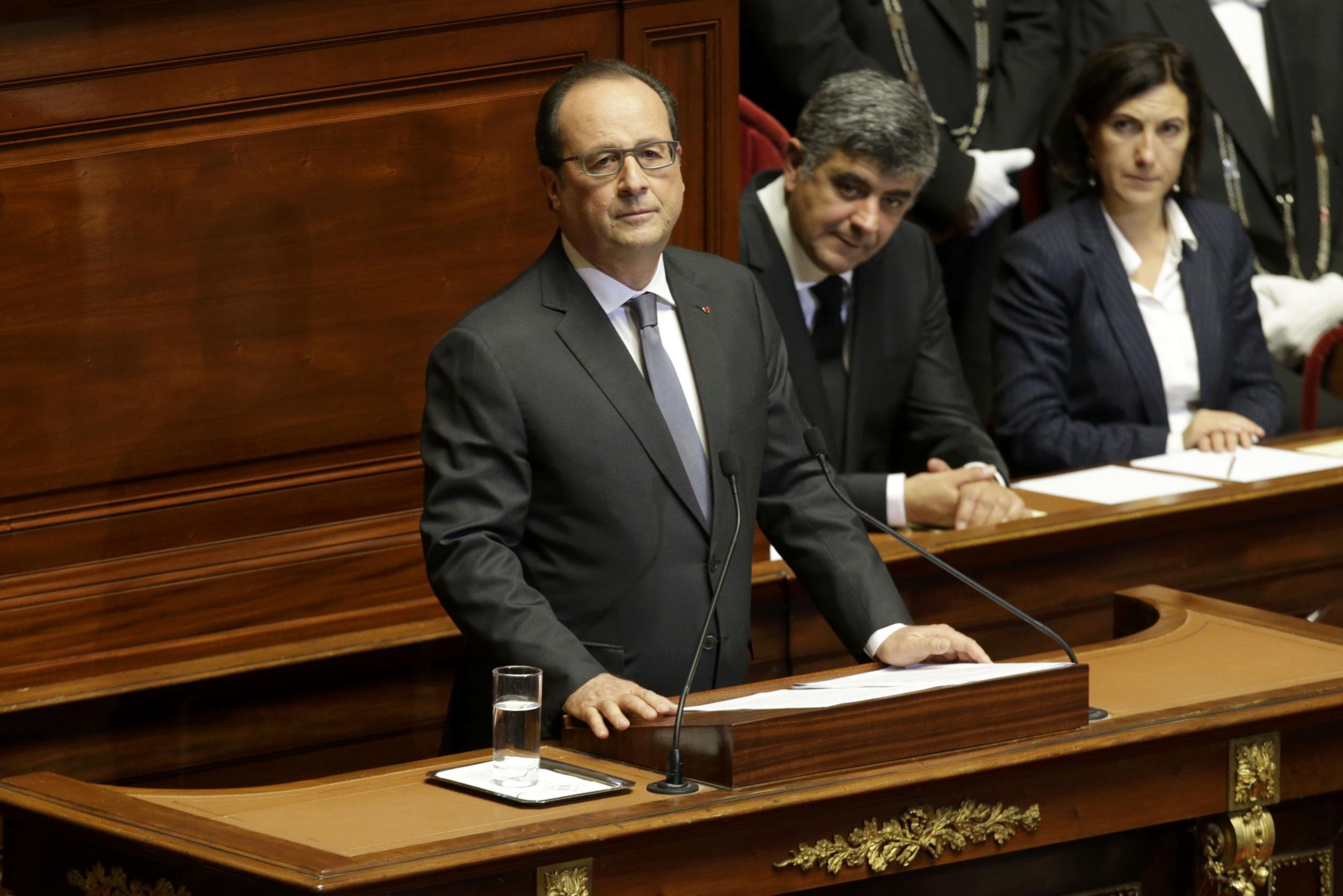Paris attacks: Francois Hollande warns Europe must control borders to prevent 'dismantling of the EU'
French President begins rare joint session of both houses of the French parliament with words: 'France is at war'

Your support helps us to tell the story
From reproductive rights to climate change to Big Tech, The Independent is on the ground when the story is developing. Whether it's investigating the financials of Elon Musk's pro-Trump PAC or producing our latest documentary, 'The A Word', which shines a light on the American women fighting for reproductive rights, we know how important it is to parse out the facts from the messaging.
At such a critical moment in US history, we need reporters on the ground. Your donation allows us to keep sending journalists to speak to both sides of the story.
The Independent is trusted by Americans across the entire political spectrum. And unlike many other quality news outlets, we choose not to lock Americans out of our reporting and analysis with paywalls. We believe quality journalism should be available to everyone, paid for by those who can afford it.
Your support makes all the difference.France’s renewed resolve to wage war on Isis is almost certain to trigger the unprecedented suspension of the Schengen agreement – the treaty which abolished systematic border checks between most European Union countries.
Addressing a rare joint session of both houses of the French parliament in the Palace of Versailles – only the second in 160 years – and beginning with the words “France is at war”, President François Hollande announced constitutional amendments to strengthen the fight against terrorism.
Extending France’s state of emergency for three months and announcing that 8,500 extra jobs are to be created in the police, judicial and border control service, Mr Hollande warned that if Europe did not control its external borders there could be a return to nationalism and, even, the “dismantling of the European Union”.
Mr Hollande’s announcement came as it was confirmed that one of the three suicide bombers at the Stade de France arrived in Greece as a “fake” Syrian refugee only five weeks earlier. Once admitted by the Greek authorities, he travelled without much trouble through Europe.
France, which woke to news that dawn raids had been launched at 168 addresses across the country, leading to 23 arrests and another 104 people being placed under house arrest, will press at an EU ministerial meeting on Friday for its European partners to trigger the “emergency” clause in Schengen which allows frontier barriers to return in times of crisis.
Mr Hollande said the aircraft carrier Charles de Gaulle will set sail for the eastern Mediterranean to “triple” France’s air-strike capacity over Syria and Iraq. “The Republic will not be destroyed by terrorism,” Mr Hollande said. “The Republic will destroy terrorism.”
The Hollande administration – previously a passionate defender of Schengen – will argue that the threat of further attacks is acute. While the danger persists, France and other EU countries must be given every opportunity to disrupt or complicate the murderous machinations of the “Islamic State”.
In short order, Mr Hollande said, there will be meetings with Barack Obama in Washington and Vladimir Putin in Moscow in order to “unite our forces to achieve a result that has taken too long”. In the past there have been short suspensions on Schengen by individual countries, notably by Germany this summer when the migrant pressure became intolerable. There is no precedent for a complete suspension of Schengen throughout continental Europe, as France is now expected to demand.
The French request appears reasonable – even inevitable. The multiple massacres in Paris last Friday were, it is clear, launched from Belgium and from further afield, in Syria. Mr Hollande responded with air strikes on the Syrian de-facto capital of Isis, Raqqa.
Two of the cars used by the attackers were hired in Brussels. At least two of the mass murderers were based there. They were able to drive the three-and-a-half hours down the motorway to Paris with impunity.
The death, or even the suspension, of Schengen will be greeted with delight on the nationalist right in Europe and with much schadenfreude by Eurosceptics in Britain.
To nationalist diehards, the Schengen area is an affront. It removes one of the most visible and potent powers of the nation state – the power to police national borders. It is also one of the most popular and visible EU achievements and an important symbol of the existence of a European Union.
The question remains, however, would border controls have prevented the Paris atrocities? Probably not. The Franco-Belgian border has been porous for many decades. There are scores of small frontier crossings.
The suspension of Schengen is probably inevitable. Its resurrection will be more difficult. Schengen, like most things in democratic life, was muddled and imperfect. Its disappearance, even “temporarily”, will be a small victory for the Eurosceptics. It will be a big victory for Isis.
Join our commenting forum
Join thought-provoking conversations, follow other Independent readers and see their replies
Comments